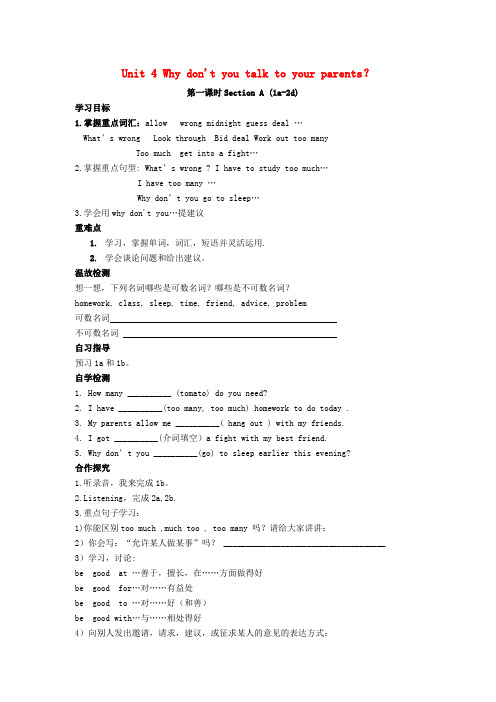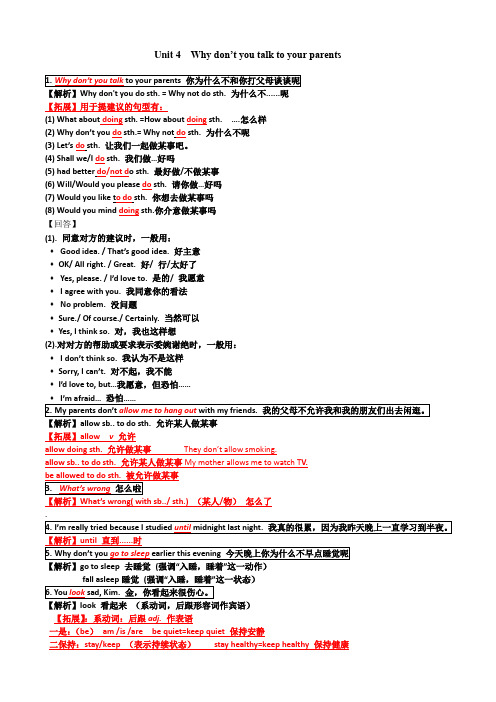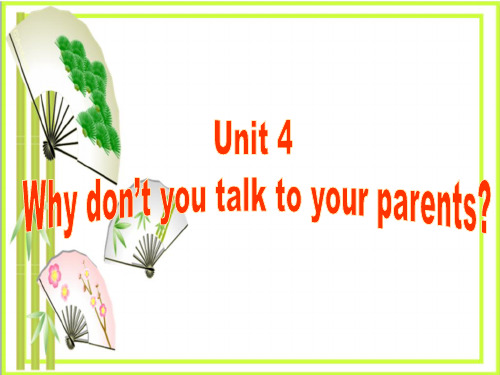why do not you talk to your parents第5课时
人教八年级英语下Unit4Whydon’tyoutalktoyourparentsPeriod5

4. Kids shouldn’t play computer games_u_n_t_il_ late at night. They should rest early.
5. _A_l_th__o_u_g_hmany people like to eat junk food, they should really eat more fruit and vegetables _s_o_t_h_a_t_theyldren take after-school classes?
2. “I want my child to be a successful person.”
Your opinions:
I disagree. Many factors may influenced in one’s life. Even though one goes to a good university, he may still can’t be successful.
8. 他们总是将自己的孩子与其他的孩子相比 较。_T_h__ey__a_lw__a_y_s_c_o_m__p_a_r_e_t_h_e_ir__c_h_il_d_r_e_n_ _w_i_th__o_t_h_e_r_c_h_i_ld_r_e_n_.____
9. 他们为什么不让孩子们顺其自然呢?
_W__h_y_d_o_n_’_t_t_h_e_y_l_e_t_t_h_e_ir__k_id_s__b_e_k_i_d_s_?___ 10. 所有这些活动会给孩子们导致很大的压
3b
Write a letter to the magazine to express your opinions on after-school classes for children. Use the following expressions to help you. Try to write two paragraphs.
2023人教版八年级英语下册交互课件-【第5课时(B 2a-2e)】 (4)

She also thinks that people shouldn’t __p_u_s_h_ their kids so hard.
Read Paragraphs & and match persons
with their opinions.
Linda Miller Dr. Alice Green
1. What are after-school activities in China? 2. Why do the students take these activities? 3. How do the students feel?
What
learning exam In China skills
Title
Guess
ABOUT WHAT?
Skimming
Match the key words with each paragraph.
Doctors’ advice
Common problem
Linda’s opinion
Cathy’s opinion
Scanning
Read Paragraph and finish the tasks.
They have a quick dinner, and then it’s time for
homework. It is time for sth.
该做某事了;到做某事的时候了
Linda Miller, a可m与oItth’setirmoe ftotdhorsethe.,进k行n转ow换s all about
3. Do you like them?
Yes _________
No _________
U4 Why don't you talk to your parents 课件八年级下册英语

Section A Grammar Focus-4c
1. 能够正确使用Why don’t you …? 句型表达建议。2. 能够正确使用连词until,although和so that。3. 能够针对他人的问题给出合理的建议,学会关心他人,并能够判断建议的合理性。4. 能够听懂Wei Ming和Alice谈论压力的对话内容,从中获取关键信息。5. 能够了解缓解压力的常见方法。
Although
Problems
Advice
Kim is very shy.
His sister and he fight all the time.
His sister spends all evening on the phone.
His cousin borrows his things without returning them.
What should I do?
Why don’t you forget about it? Although she’s wrong, it’s not a big deal.
What should he do?
He should talk to his friend so that he can say he’s sorry.
I guess Icould , but I don't want
to surprise him
1 .掌握提出问题的方法,What s wrong?What1 s the matter?What' s the problem/the trouble? 并能讨论所给出的建议。
Kim's Summary
【学练优】(江西专用)春八年级英语下册 Unit 4 Why don’t you talk to

Unit 4 Why don't you talk to your parents?第一课时Section A (1a-2d)学习目标1.掌握重点词汇:allow wrong midnight guess deal …What’s wrong Look through Bid deal Work out too manyToo much get into a fight…2.掌握重点句型: What’s wrong ? I have to study too much…I have too many …Why don’t you go to sleep…3.学会用why don't you…提建议重难点1.学习,掌握单词,词汇,短语并灵活运用.2.学会谈论问题和给出建议。
温故检测想一想,下列名词哪些是可数名词?哪些是不可数名词?homework, class, sleep, time, friend, advice, problem可数名词不可数名词自习指导预习1a和1b。
自学检测1. How many __________ (tomato) do you need?2. I have __________(too many, too much) homework to do today .3. My parents allow me __________( hang out ) with my friends.4. I got __________(介词填空)a fight with my best friend.5. Why don’t you __________(go) to sleep earlier this evening?合作探究1.听录音,我来完成1b。
2.Listening,完成2a,2b.3.重点句子学习:1)你能区别too much ,much too , too many 吗?请给大家讲讲:2)你会写:“允许某人做某事”吗? _____________________________________ 3)学习,讨论:be good at …善于,擅长,在……方面做得好be good for…对……有益处be good to …对……好(和善)be good with…与……相处得好4)向别人发出邀请,请求,建议,或征求某人的意见的表达方式:(1)Why don’t you do something? /Why not do something?“你为什么不做某事呢?”(2)How /What about doing sth.?(about是个介词,可跟名词或动名词)“……怎么样?”e.g.: How/what about the photo album? 一个像册怎么样?How about getting her a scarf? 买条围巾送给她怎么样?(3)You’d better (not) do something.“你最好(不)做某事”(4)Would you like sth …?:“你想要某吗”物(5)Let’s do sth…?(6)What should I do …?( should表示请求、征询对方意见)e.g.: What should I get my dad for his birthday?我该送给爸爸什么作为他的生日礼物呢?达标检测一.汉译英。
unit4-Why-don27t-you-talk-to-your-parents全单元知识点和练习

Unit 4 Why don’t you talk to your parents【解析】Why don't you do sth. = Why not do sth. 为什么不......呢【拓展】用于提建议的句型有:(1) What about doing sth. =How about doing sth. ….怎么样(2) Why don’t you do sth.= Why not do sth. 为什么不呢(3) Let’s do sth. 让我们一起做某事吧。
(4) Shall we/I do sth. 我们做…好吗(5) had better do/not d o sth. 最好做/不做某事(6) Will/Would you please do sth. 请你做…好吗(7) Would you like t o do sth. 你想去做某事吗(8) Would you mind doing sth.你介意做某事吗【回答】(1). 同意对方的建议时,一般用:◆ Goo d idea. / That’s good idea. 好主意◆OK/ All right. / Great. 好/ 行/太好了◆ Yes, please. / I’d love to. 是的/ 我愿意◆ I agree with you. 我同意你的看法◆ No problem. 没问题◆Sure./ Of course./ Certainly. 当然可以◆Yes, I think so. 对,我也这样想(2).对对方的帮助或要求表示委婉谢绝时,一般用:◆ I don’t think so. 我认为不是这样◆Sorry, I can’t. 对不起,我不能◆I’d love to, but…我愿意,但恐怕……【解析】allow sb.. to do sth. 允许某人做某事【拓展】allow v 允许allow doing sth. 允许做某事They don’t allow smoking.allow sb.. to do sth. 允许某人做某事My mother allows me to watch T V.【解析】What’s wrong( with sb../ sth.) (某人/物)怎么了【解析】go to sleep 去睡觉(强调“入睡,睡着”这一动作)这一状态)【解析】look 看起来(系动词,后跟形容词作宾语)【拓展】:系动词:后跟adj.作表语一是:(be)am /is /are be quiet=keep quiet 保持安静二保持:stay/keep (表示持续状态)stay healthy=keep healthy 保持健康三变化:become/get/turn (表示状态变化)【解析】call up (v + adv) call on 拜访;号召【解析】find sb.. doing sth. 发现某人正在做某事Mr. Wang found Li Dong reading a storybook in the class.类似动词:hear,watch, see, feel【解析】be angry with sb.. 生某人的气【拓展】angry adj.生气的→ angrily adv. 生气地(1)be angry with sb.. =be mad at sb.. 对某人生气【with后接人】(2)be angry at/about sth.对某事感到生气【at后接事】(3)be angry to do sth. 做某事感到生气10. It’s not a bi g deal. 没什么大不了;不是什么大事(常用于口语中)You left your homework at home. 你把作业忘在家里了。
《Why don't you talk to your parents》5 图文

3b Do you agree or disagree with
Mr. Hunt’s advice? Why?
1. I agree with his advice. Because more communication can make family members understand each other better and know about the feelings they have.
His brother always watches TV whatever he wants until midnight. He __re_f_u_s_e_s to let him watch his favorite TV show. So He always feels _lo_n_e_l_y_ and __n_e_rv_o_u__s at home.
Hmm… that’s not very nice. Did she give them back to you? ...
cloud n. 云; 云朵 elder adj. 年纪较长的
communication n. 交流; 沟通
1. relation n. 关系; 联系; 交往 e.g. Their relation seemed
3. My parents don’t allow me to hang out with my friends. Why not read some interesting books at home?
4. I have too many after-school classes. Why don’t you talk about it with your parents?
5. I got into a fight with my best friend.
Unit4-Why-don't-you-talk-to-your-parents课件
1. I have to study too much so I don’t get enough sleep. 得到足够的睡眠
2. I have too much homework so I don’t have any free time to do things I like.
3. My有p空ar闲e时nt间s d干o某n事’t allow me to hang out
8.Today Tom has too ____ homework to do.
much
第15页,共49页。
Unit 4 Why don’ t you talk to
your parents?
第16页,共49页。
1.关系,联系 relation 2.交流 communicate
3.和睦相处 get on with
第20页,共49页。
Problems
Advice
1.I can’t get on well with 1. Why don’t you talk
my family
about these feelings
2.Parents fight a lot. with your family?
3.My elder brother is not
4.云朵 cloud
5.争吵 argue
6.年级较长的 elder
7.代替 instead 8.任何,每一 whatever
9.焦虑的
nervous
11.恰当的
proper
13.解释,说明
10.主动提供
12.第二,其次 14.清楚的
offer
secondly
15.浏览
人教新目标版英语八下Unit4《Whydon’tyoutalktoyourparents》说课稿
人教新目标版英语八下Unit 4《Why don’t you talk to your parents》说课稿一. 教材分析人教新目标版英语八下Unit 4主要讨论了如何与父母沟通的问题,通过本节课的学习,学生能够掌握一定的沟通技巧,提高与父母交流的能力。
本单元的主题贴近学生的生活,有利于激发学生的学习兴趣和积极性。
二. 学情分析根据我对学生的了解,他们在学习过程中已经掌握了基本的英语语法和词汇,具备一定的听说读写能力。
但部分学生在与父母沟通方面存在一定的困扰,可能因为害羞、害怕被批评等原因而不愿意与父母交流。
因此,本节课的教学目标在于帮助学生克服这些障碍,提高他们的沟通能力。
三. 说教学目标1.知识目标:学生能够掌握本节课的重点词汇和句型,如“Why don’tyou…?”,“Because…”等,并能够运用这些词汇和句型进行简单的交流。
2.能力目标:学生能够通过听力、口语、阅读和写作等多种方式,提高自己的英语应用能力。
3.情感目标:学生能够认识到与父母沟通的重要性,学会尊重和理解父母,提高与父母相处的质量。
四. 说教学重难点1.重点:本节课的重点是让学生掌握并运用句型“Why don’t you…?”和“Because…”进行交流。
2.难点:如何帮助学生克服害羞、害怕被批评等心理障碍,提高他们与父母沟通的勇气和信心。
五. 说教学方法与手段1.任务型教学法:通过设计各种真实的任务,让学生在完成任务的过程中运用所学知识,提高英语实际应用能力。
2.情境教学法:创设各种与父母沟通的情境,让学生在模拟实践中学会如何与父母交流。
3.小组合作学习:通过小组讨论、分享等方式,促进学生之间的互动,提高他们的合作能力和沟通能力。
六. 说教学过程1.导入:通过一个关于父子间沟通的小故事,引发学生对与父母沟通的思考,激发他们的学习兴趣。
2.呈现:介绍本节课的主题,展示相关的词汇和句型,让学生初步感知和学习。
3.实践:设计各种与父母沟通的情境,让学生在模拟实践中运用所学知识。
舟山市八中八年级英语下册Unit4Whydon'tyoutalktoyourparents笔记单词+
Unit 4 Why don't you talk to your parents?◆必记单词1.allow v. 允许;准许高频2.wrong adj. 有毛病的;错误的3.guess v. 猜测;估计4.deal n. 协议;交易5.relation n. 关系;联系;交往→relate v. 与……有联系6.communication n. 交流;沟通7.argue v. 争吵;争论8.cloud n. 云;云朵→cloudy adj. 多云的9.elder adj. 年纪较长的→older adj. 年长的10.instead adv. 代替;反而;却高频11.whatever pron. 任何;每一→what pron. 什么12.nervous adj. 焦虑的;担忧的→nervousness n. 紧张感13.offer v. 主动提出;自愿给予高频n. 提议;出价14.proper adj. 正确的;恰当的→properly adv. 合适地15.secondly adv. 第二;其次→second num. 第二16.communicate v. 交流;沟通17.explain v. 解释;说明→explanation n. 解释;说明18.clear adj. 清楚易懂的;晴朗的→clearly adv. 清晰地19.copy v. 抄袭;模仿;复制;复印n. 份;副本20.return v. 归还;回来;返回21.anymore adv. (常用于否定句和疑问句末)再也(不);(不)再高频22.member n. 成员;分子→membership n. 成员资格23.pressure n. 压力→press v. 按;压24.compete v. 竞争;对抗→competition n. 竞争;对抗→competitor n. 竞争者;对手25.opinion n. 意见;想法;看法高频26.skill n. 技艺;技巧→skilled adj. 技艺娴熟的27.typical adj. 典型的28.football n. (美式)橄榄球;足球29.quick adj. 快的;迅速的;时间短暂的高频→quickly adv. 快速地→slow adj. 缓慢的(反义词)30.continue v. 持续;继续存在31.compare v. 比较高频32.crazy adj. 不理智的;疯狂的→mad adj. 疯狂的33.push v. 鞭策;督促;推动→pull v. 拉34.development n. 发展;发育;成长→develop v. 发展35.cause v. 造成;引起36.usual adj. 通常的;寻常的高频→usually adv. 通常→unusual adj. 不平常的(反义词) 37.perhaps adv. 可能;大概;也许◆重点短语1.allow sb. to do sth. 允许某人做某事高频【拓展】let sb. do sth.让某人做某事2.call up 打电话3.have a fight with 与……打架/争吵【拓展】fight with sb.与……打架4.look through 快速查看;浏览高频【拓展】look out 小心look for 寻找look after 照看look like 看起来像look up 查阅5.big deal 重要的事6.work out 成功地发展;解决7.get on with 和睦相处;关系良好高频【拓展】get along with 与……相处8.refuse to do sth. 拒绝做某事高频9.communicate with 与……交流高频10.compare...with... 比较;对比高频【拓展】compare...to...把……比作……11.not...anymore 不再【拓展】not...any longer 不再no longer 不再12.worry about 担心高频【拓展】be worried about 担心13.cut out 删除;删去【拓展】cut off 切断cut down 砍倒;削减cut up 切碎14.be good for 对……有好处高频【拓展】be good to 对……有好处do harm to 对……有害be harmful to 对……有害15.think of 想到16.in one's opinion 依……看高频◆重点句子1.I have too much homework so I don't have any free time to do things I like.我有太多的家庭作业,所以我没有任何空闲时间做我喜欢的事。
人教新目标八年级英语下册Unit4Whydon'tyoutalktoyourparents说课稿
人教新目标八年级英语下册Unit 4 Why don’t you talk to your parents说课稿一. 教材分析人教新目标八年级英语下册Unit 4 Why don’t you talk to your parents是一篇关于日常交流和沟通的文章。
本篇文章主要讲述了在遇到问题时,如何与父母沟通,寻求解决方案。
通过本节课的学习,学生能够掌握情态动词why not的用法,以及如何运用交际策略进行日常交流。
教材内容贴近学生生活,有利于激发学生的学习兴趣和积极性。
二. 学情分析八年级的学生已经掌握了基本的英语语法和词汇,具备一定的听说读写能力。
但在实际交流中,学生往往因为害羞、紧张等原因不敢开口说英语,本题正好可以引导学生学会如何与父母沟通,提高他们的交际能力。
同时,学生在这个年龄段开始关注家庭和社交问题,对本节课的内容会产生浓厚兴趣。
三. 说教学目标1.知识目标:学生能够掌握情态动词why not的用法,了解日常交际中的沟通策略。
2.能力目标:学生能够运用所学知识进行日常交流,提高口语表达能力。
3.情感目标:学生学会与父母沟通,增进家庭关系,培养良好的交际习惯。
四. 说教学重难点1.重点:情态动词why not的用法和日常交际策略。
2.难点:如何运用所学知识进行实际交流,克服羞涩、紧张等心理障碍。
五. 说教学方法与手段1.情景教学法:通过设定情景,让学生在实际语境中学习英语,提高交际能力。
2.任务型教学法:学生分组完成任务,激发学习兴趣,培养合作精神。
3.互动式教学法:教师与学生互动,引导学生积极参与课堂讨论,提高口语表达能力。
六. 说教学过程1.导入:用一段关于家庭沟通的短片引出本节课的主题,激发学生的学习兴趣。
2.新课呈现:教师展示文章,引导学生关注文章标题和关键词,预测文章内容。
3.课堂讲解:教师讲解情态动词why not的用法和日常交际策略,让学生通过例句理解并掌握。
4.实践环节:学生分组进行角色扮演,运用所学知识进行实际交流,教师巡回指导。
- 1、下载文档前请自行甄别文档内容的完整性,平台不提供额外的编辑、内容补充、找答案等附加服务。
- 2、"仅部分预览"的文档,不可在线预览部分如存在完整性等问题,可反馈申请退款(可完整预览的文档不适用该条件!)。
- 3、如文档侵犯您的权益,请联系客服反馈,我们会尽快为您处理(人工客服工作时间:9:00-18:30)。
பைடு நூலகம்
6. 我应该怎么做呢? What should I do?
7. 你应该买些新衣服. You should buy some new clothes.
1. 我的哥哥有着和我的一样的发型。
My brother has the same haircut as I do.
Word Study
talk find out call up argue say
1. Let’s _______ call up Joe and invite him to play tennis. talk about your problems with 2. You should _____ your parents. 3. My friend is angry with me. What should I say to him? _______ argue Let’s forget it. 4. I don’t want to ______. found out 5. I thought I failed my test but I just ________ I passed!
翻译下列句子: 1.你怎么了? What’s wrong with you? 2. 我没有足够的钱. I don’t have enough money. 3. 我和我的好朋友吵了一架.
I argued with my best friend.
4. 我的衣服过时了. My clothes are out of style. 5. 我父母想让我每天晚上都呆在家里.
so that
Although
so that until Although so that
You should buy a ticket for him.
Why don’t you explain the reason why you don’t go?
What about telling him to do something else?
2. 他和比尔盖茨一样富裕。
He is as rich as Bill Gates.
